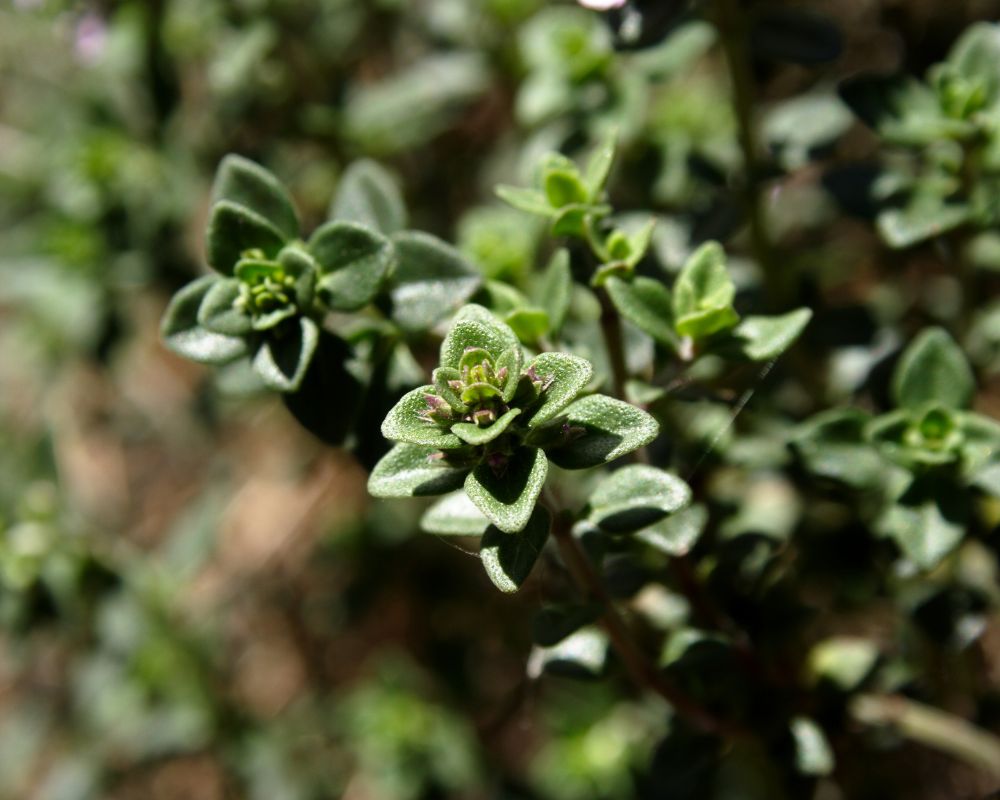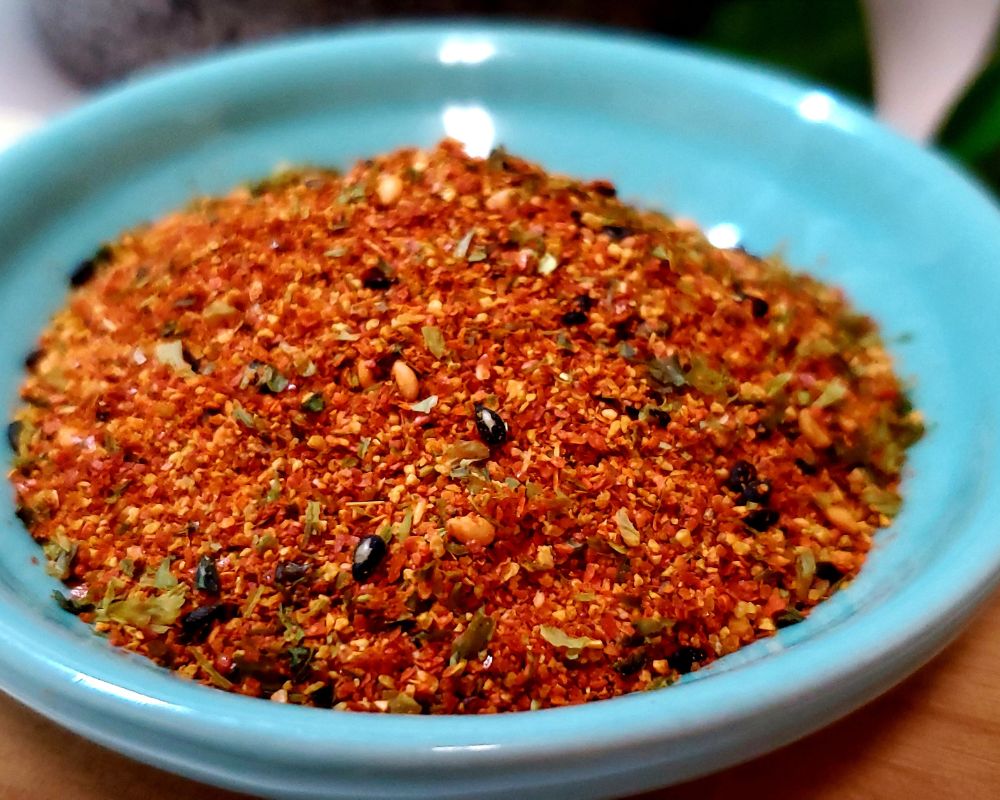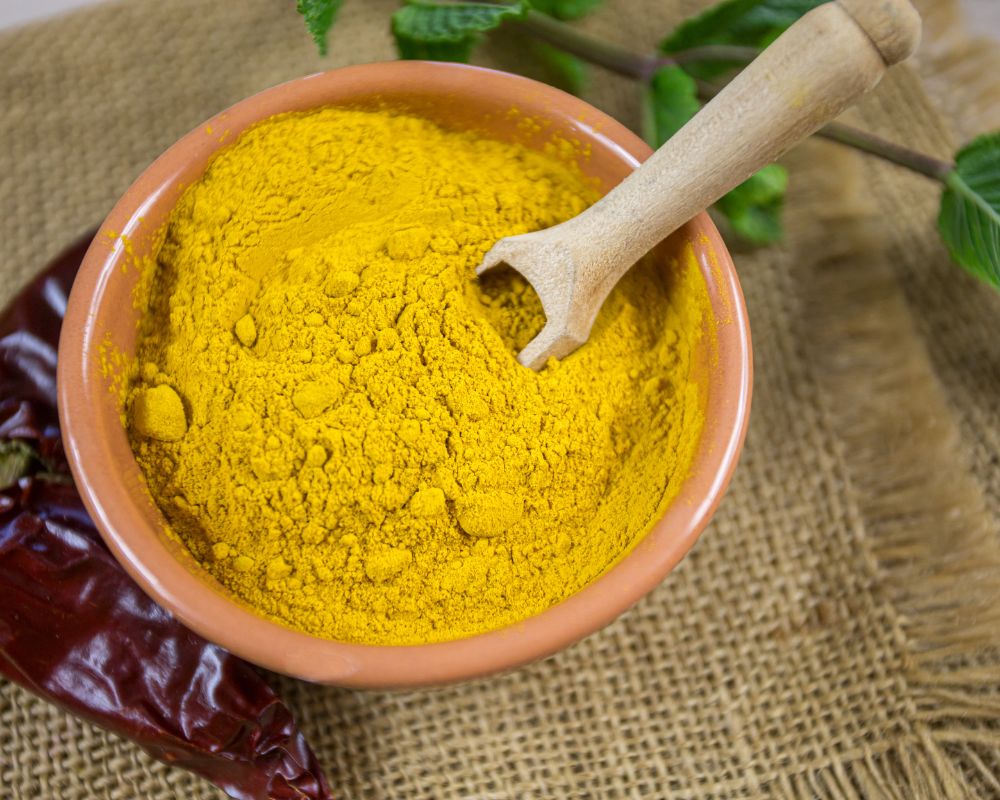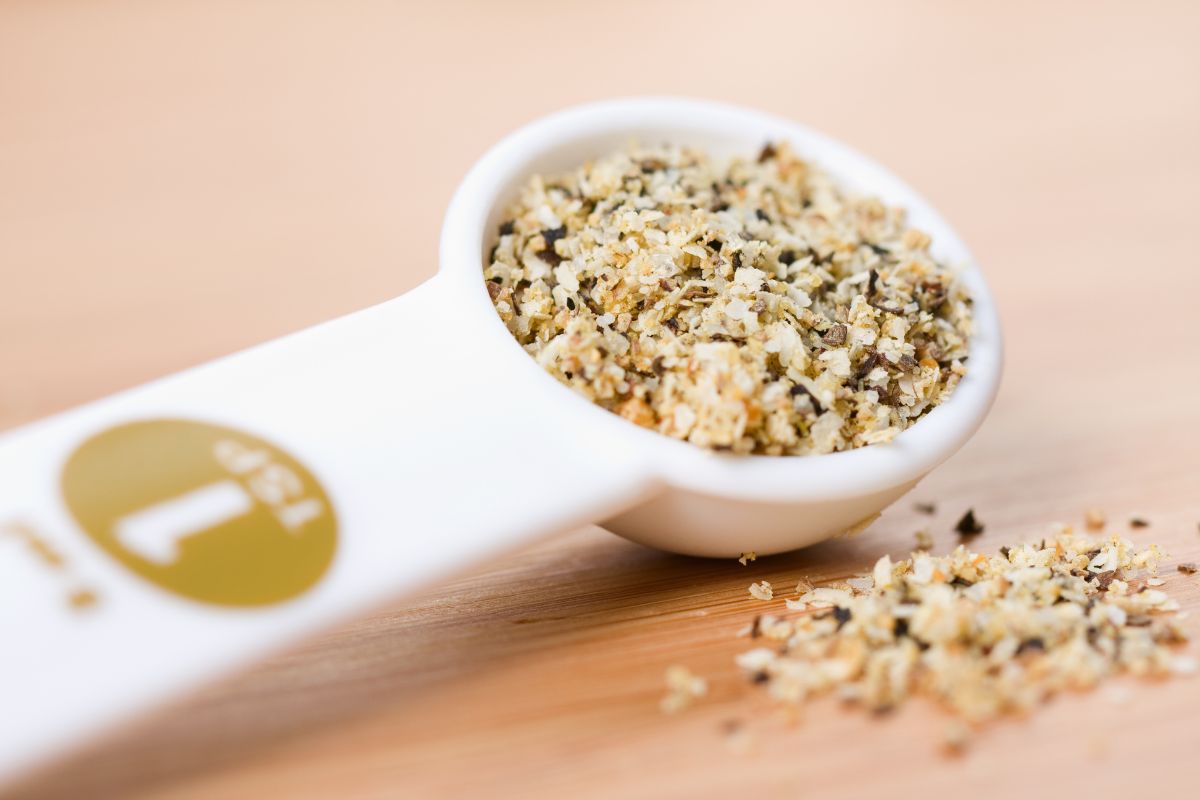Lemon thyme, lemon curry powder, and shichimi togarashi are the best lemon pepper substitutes. The three spices have a citrusy flavor, while the spiciness lacking in lemon thyme is added by combining it with black pepper.
Table of Contents
What does lemon pepper taste like?
Lemon pepper has an easy-to-replicate citrus flavor similar to the citrus-lemony flavor of lemon zest.
The citrus-lemony flavor profile of lemon pepper is the same for homemade and store-bought versions. While homemade lemon pepper is made with the peels of fresh lemons, store-bought lemon pepper contains lemon or citric acid, which adds the citrus flavor.
What is lemon pepper seasoning made of?
Lemon pepper seasoning features two key ingredients:
- Ground dried lemon peels (lemon zest). These provide lemon flavor.
- Ground black pepper (ground black peppercorns). This provides heat or spiciness.
Sea salt or regular salt is usually added to provide saltiness and depth to the basic lemon pepper made with only lemon zest and black pepper.
Other ingredients optionally added to the versatile seasoning for depth include:
| Dried garlic powder | This subtly adds a depth of flavor with its garlicky notes |
| Dried onion powder | This adds a sweet, savory flavor ideal for savory dishes that require lemon pepper |
| Celery powder | This spice adds sweetness and a mildly salty taste to lemon pepper |
| Cumin | This spice adds pepperiness and citrus to lemon pepper |
| Coriander | This spice has citrusy notes that merge with the citrusy flavor of lemon zest |
| Dill seeds | These bring a citrus-fresh taste to lemon pepper |
| Parsley flakes | These add a peppery flavor to lemon pepper |
What spice blend mimics lemon pepper?
The best spice blend for mimicking lemon pepper is a mixture of lemon, thyme, and onion powder.
Lemon brings the characteristic citrusy flavor, which is enhanced by the slightly lemony flavor of thyme. Thyme is also a bit peppery, hence bringing the heat sought from black pepper.
Onion powder adds sweetness and savoriness to lemon pepper, making it ideal for savory dishes that require lemon pepper seasonings, such as vegetables and braised meats.
What is the best substitute for lemon pepper?
It’s easy to replicate the flavor profile of lemon pepper with several alternatives, but the following three are the best for solid and liquid dishes.
- Lemon thyme
- Shichimi togarashi
- Lemon curry powder
| Lemon thyme | Lemon thyme has less acidity than lemon pepper, ideal for flavoring meats, stews, soups, fish, roasted veggies, and salad dressings |
| Shichimi togarashi | Packs the dish with floral notes, sweetness, and umami flavor, used in noodles, grilled meat, soups, seafood, and fish |
| Lemon curry powder | May also be infused with lemon for light citrusy notes, great for seafood, chicken, casseroles, soups, sauces, rice dishes, eggs, curries, vegetables, and dressings |
1. Lemon Thyme

The lemon flavor in lemon thyme comes from thymol and limonene, making it a great substitute for lemon pepper seasoning. The most notable difference is that lemon thyme has less acidity than lemon pepper.
Besides citrus, lemon thyme has floral and thyme notes. It brings the earthiness that comes from thyme. It also brings the aromatic flavor characteristic of spices from the mint family.
A 2:1 ratio of lemon thyme to lemon pepper is ideal for flavoring meats, stews, soups, fish, roasted veggies, and salad dressings.
On its own, lemon thyme adds a citrusy flavor to your dish. Combine it with black pepper to match the citrusy flavor and spiciness of lemon pepper seasoning.
2. Shichimi Togarashi

Seven Japanese spices make up shichimi togarashi, including:
- Roasted orange peel
- Poppy seeds
- White sesame seeds
- Black sesame seeds
- Ground sansho (Japanese pepper)
- Ground ginger
- Szechuan peppers
Nori (seaweed) and hemp seeds may also be a part of shichimi togarashi.
Shichimi togarashi is a good substitute for lemon pepper because the orange peel provides a matching citrusy flavor, while ground sansho and Szechuan red chili peppers provide matching heat.
Besides the citrus flavor, shichimi togarashi packs your dish with floral notes, sweetness, and umami flavor.
Use a 1:1 ratio when replacing lemon pepper with shichimi togarashi to flavor noodles, grilled meat, soups, seafood, and fish. The Japanese spice mix also functions as a spicy dry rub for meats.
3. Lemon Curry Powder

The pepper and lemon notes in lemon curry powder come from the ground black pepper and powdered lemon juice or dried lemon zest in the spice blend.
Lemon curry powder may also be infused with lemon for light citrusy notes, rather than having dried lemon zest or powdered lemon juice added directly as a main ingredient.
Use a 1:1 ratio when replacing lemon pepper seasoning with lemon curry powder to flavor seafood, chicken, casseroles, soups, sauces, rice dishes, eggs, curries, vegetables, and dressings.
Lemon curry powder also works as a dry rub. You can add other ingredients to make it a lemony marinade with a strong spicy flavor.
You’ll want to watch out how much lemon curry powder you use because it contains turmeric, which changes the color of food to bright yellow. Use this spice if you don’t mind the color change.
Can you use lemon juice instead of lemon pepper?
You can use lemon juice instead of lemon pepper, but it has limitations. Firstly, the spice goes bad quickly. You would have to turn it into a powder to prolong its shelf life.
Secondly, being a liquid spice, lemon juice is only ideal for liquid dishes.
You could use black pepper and salt to add heat and saltiness to complete lemon juice as a substitute for lemon pepper.
Lemon juice is ideal as a base for sauces, such as lemon pepper sauce, and in marinade recipes, such as lemon pepper marinade.
Homemade lemon pepper seasoning
Making lemon pepper seasoning at home means you have total control over the amount and quality of the ingredients you add to the blend.
To make the citrusy seasoning mix, use the ingredients and instructions below.
Ingredients:
- 10 unwaxed fresh lemons
- 2 tablespoons ground black pepper
- 1/2 teaspoon sea salt
- 1 tablespoon onion powder
- 1 tablespoon garlic powder
Instructions:
- Wash the ripe lemons and pat them dry with paper towels.
- Preheat your oven to 150°F.
- Use a vegetable peeler or sharp knife to remove the yellow outer skin of the lemons with as little white pith as possible. Alternatively, use a grater to produce finer lemon zest.
- Place the peels or lemon zest on oven trays while leaving spaces between them. Dry them for 30-55 minutes until curly. Lemon zest has a shorter drying time because of its finer texture.
- Remove the dried peels or lemon zest from the oven and allow them to cool for 2-5 minutes.
- Use a spice grinder or food processor to grind the peels for 30-45 seconds to a coarse texture or 1-2 minutes for a finer texture. The lemon zest will require 15-20 seconds of blending to reach a fine texture.
- Combine black pepper, salt, onion powder, garlic, and dried lemon peels or zest in a large bowl and stir thoroughly.
- Use the lemon pepper blend immediately and store the surplus in an airtight container in a cool, dry place.
Can lemon pepper seasoning go bad?
Properly stored lemon pepper seasoning lasts up to two years without going bad. However, it starts losing potency after six months of storage.
Store your lemon pepper seasoning blend in airtight containers, such as glass jars, at room temperature in a cool, dry place and use within three months for ideal spiciness.
You can make the shelf life longer than 3-6 months by keeping it in vacuum-sealed containers or storing it in a freezer.

